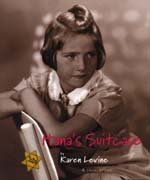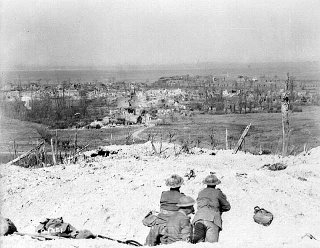 And no birds sang by Farley Mowat.
And no birds sang by Farley Mowat.In July 1942, Farley Mowat was an eager young infantryman bound for Europe and impatient for combat. This powerful, true account of the action he saw, fighting desperately to push the Nazis out of Italy, evokes the terrible reality of war with an honesty and clarity fiction can only imitate. In scene after unforgettable scene, he describes the agony and antic humor of the soldier's existence: the tedium of camp life, the savagery of the front, and the camaraderie shared by those who have been bloodied in battle. - from the publisher.
Author Spotlight at Random House.
 The sky is falling by Kit Pearson.
The sky is falling by Kit Pearson.
During World War II, thousands of British children were evacuated to Canada. Many would spend the war years in the homes of complete strangers. In her award-winning novel for middle readers, The Sky Is Falling, Kit Pearson tells the story of one war child whose Canadian visit was far from happy. Norah has no wish to leave her village home in the English countryside. And she certainly doesn't want the responsibility of looking out for her five-year-old brother Gavin. When it becomes clear that the wealthy Toronto widow who sponsored the two siblings really only wanted a boy, Norah retreats into a secret world of books and truancy, deserting Gavin to the overbearing attentions of his newly appointed "Aunt Florence." - from the publisher.
 Turned away: the World War II diary of Devorah Bernstein by Carol Matas.
Turned away: the World War II diary of Devorah Bernstein by Carol Matas.
January 9, 1911: A letter arrived from Sarah, again tucked in with the mail from Uncle Nathaniel.
Chere Devorah,
Our worst fears came to pass. Three huge bangs on the door. Maman ran to my room and told me to keep the door closed and not to come out. Within minutes she came back and sank down on my bed weeping. "They've taken him," she said. "To Drancy. Arrested."
I can barely sleep anymore. I keep hearing that pounding on the door. Sometimes I feel the sound will explode in my brain. Chere Devorah, what is wrong with the world? I don't understand any of this. Do you?
Your loving cousin, Sarah.
The letter from Uncle Nathaniel told of being arrested, but little else, except another question about how the visas are going. I could hear Mommy crying from her bedroom. - from the publisher.
Carol Matas' website.
 Hana's suitcase by Karen Levine.
Hana's suitcase by Karen Levine.
In 2000, a suitcase arrived at a children's Holocaust education center in Tokyo, Japan, marked Hana Brady, May 16, 1931, and "Waisenkind"--the German word for orphan. In a suspenseful journey, Fumiko, the center's curator, searches for clues to young Hana and her family. -from the publisher.
Hana's Suitcase website, including an interview with George Brady.
Watch a TV clip about Hana's suitcase.
Listen to the radio documentary that inspired this book.
Winning the Ridge: the Canadians at Vimy Ridge, 1917 by N. M. Christie.
"On April 9th, 1917, for the first time in the war, all four Canadian Infantry Divisions attacked side by side. Their capture of the 'impregnable' German bastion of Vimy Ridge brought instantaneous, world-wide recognition. For the first time in the war, the Allies had won something tangible.
"With the capture of Vimy Ridge, the reputation of the Canadian Corps as the most effective fighting machine on the Western Front, and of Canada itself, was sealed." - p. vii.
Many historians point to the Battle of Vimy Ridge on Easter Monday, 1917, as the beginnings of Canada's national identity. With almost 11,000 casualties this identity came at a high price, and Vimy is the site of the only Canadian National Historic Site outside of Canada's political boundaries.
Watch veteran eyewitness accounts of Vimy.

No comments:
Post a Comment